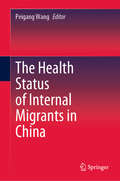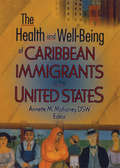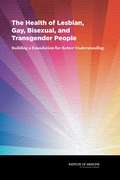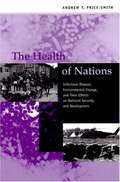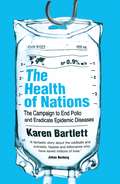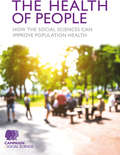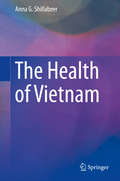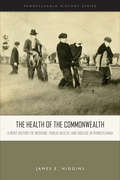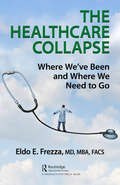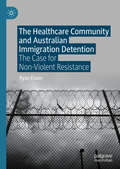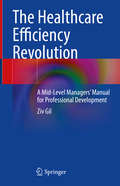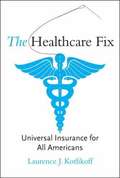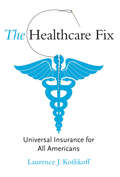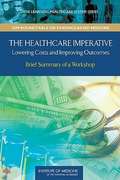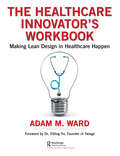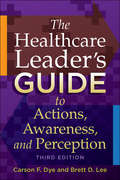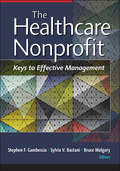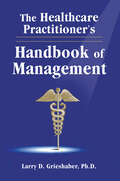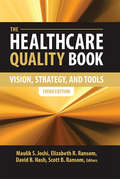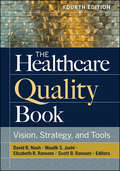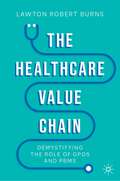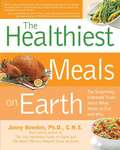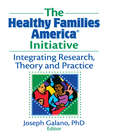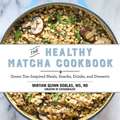- Table View
- List View
The Health Status of Internal Migrants in China
by Peigang WangThis book describes the health status of internal migrants in China and explores a number of related factors, which include their physical health, mental health, fertility, social integration, the current state of basic public health services in China and so on. At present, there are 245 million migrants working in China, which means 1 out of every 6 people is a migrant. The large scale of the migrant population is accompanied by a range of problems concerning e.g. public health and medical services. This book draws on the latest findings and data to describe and analyze the health status of migrants in China from three perspectives – population distribution, time distribution and spatial distribution – and each chapter employs various advanced statistical methods, such as multilevel modeling and propensity score matching. Given the in-depth information it provides, the book will appeal to managers, clinicians, and researchers from many fields. It shares valuable insights into the health status of and related factors concerning China’s internal migrants, while also providing a sound scientific basis for decision-makers.
The Health and Well-Being of Caribbean Immigrants in the United States
by Annette MahoneyThe Health and Well-Being of Caribbean Immigrants in the United States is a timely addition to the knowledge base concerning the integration of this population into the fabric of American society. On the eve of the fortieth anniversary of the 1965 Immigration Reform Act, this book examines the relationship between immigrants from the Caribbean and the culture of the United States. This body of work provides resources for scholars and researchers and provides instrumental strategies for use in practice by counselors/social workers, curriculum developers, and immigration analysts.With this book, you will develop a new appreciation for the social capital immigrants bring with them, their adaptation to their new society, and the extent to which their distinctive characteristics promote or hinder their social mobility. Using tables, figures, and graphs, The Health and Well-Being of Caribbean Immigrants in the United States provides thorough analyses of broad-ranging issues and proposes viable solutions to the problems these immigrants face.In this important resource, expert educators, researchers, and community leaders address the unique challenges that affect this population, including: increased infant mortality rates increased HIV/AIDS among the Caribbean community the growing trend of violence and abuse among Caribbean and Caribbean-American youths the special needs of aging and elderly immigrants living in the United States the impact of the 1996 immigration legislation on Caribbean familiesThe Health and Well-Being of Caribbean Immigrants in the United States paints a clear picture of how these citizens are coping with the social, economic, and political aspects of the American way of life. This guide offers new findings and insight into the reality of the diverse immigrant Caribbean population, setting the stage for establishing groundbreaking initiatives to develop better support services. Innovative community-based approaches and culturally specific prescriptive intervention models make this book an integral source for social scientists, human service professionals, and policymakers.
The Health of Lesbian, Gay, Bisexual, and Transgender People: Building a Foundation for Better Understanding
by Institute of Medicine of the National AcademiesAt a time when lesbian, gay, bisexual, and transgender individuals--often referred to under the umbrella acronym LGBT--are becoming more visible in society and more socially acknowledged, clinicians and researchers are faced with incomplete information about their health status. While LGBT populations often are combined as a single entity for research and advocacy purposes, each is a distinct population group with its own specific health needs. Furthermore, the experiences of LGBT individuals are not uniform and are shaped by factors of race, ethnicity, socioeconomic status, geographical location, and age, any of which can have an effect on health-related concerns and needs. The Health of Lesbian, Gay, Bisexual, and Transgender People assesses the state of science on the health status of LGBT populations, identifies research gaps and opportunities, and outlines a research agenda for the National Institute of Health. The report examines the health status of these populations in three life stages: childhood and adolescence, early/middle adulthood, and later adulthood. At each life stage, the committee studied mental health, physical health, risks and protective factors, health services, and contextual influences. To advance understanding of the health needs of all LGBT individuals, the report finds that researchers need more data about the demographics of these populations, improved methods for collecting and analyzing data, and an increased participation of sexual and gender minorities in research. The Health of Lesbian, Gay, Bisexual, and Transgender People is a valuable resource for policymakers, federal agencies including the National Institute of Health (NIH), LGBT advocacy groups, clinicians, and service providers.
The Health of Nations: Infectious Disease, Environmental Change, and Their Effects on National Security and Development
by Andrew T. Price-SmithSmith investigates the influence of infectious disease on nations' stability and prosperity. He also provides a theoretical and empirical foundation for the emerging field of health security.
The Health of Nations: The Campaign to End Polio and Eradicate Epidemic Diseases
by Karen Bartlett&‘Hope lies in dreams, in imagination, and in the courage of those who dare to make dreams into reality.&’ – Jonas Salk, inventor of one of the first successful polio vaccines No one will die of smallpox again… One of the worst killers ever is now consigned to history – perhaps the greatest humanitarian achievement of our age. Now polio, malaria and measles are on the hit list. Karen Bartlett tells the dramatic story of the history of eradication and takes us to the heart of modern campaigns. From high-tech labs in America to the poorest corners of Africa and the Middle East, we see the tremendous challenges those on the front lines face every day, and how they take us closer to a brave new world.
The Health of People: How the social sciences can improve population health
by Campaign for Social ScienceAs Britain ages amid austerity, more and more people will suffer from long-term health conditions. Obesity and diabetes are on the rise. Mental health problems are widespread. Tobacco and addictions are well-known killers. Each condition brings high costs, both financial and social. Meanwhile, budgets for the NHS, social care and public health are being squeezed. Despite this potential crisis, new opportunities are emerging to support both healthcare providers and the population. Advances in understanding will change how behaviour can prevent and mitigate ill health. Our approach to health must become more ‘social’. The Health of People – a report compiled by the Campaign for Social Sciences – investigates a range of ways to cut the cost of health interventions and to improve patient outcomes as well as ways of preventing people becoming patients. The report includes arguments for and case studies in favour of a more rounded, social science informed view of health and wellbeing. It concludes with an invitation to clinicians and policy makers to think outside the box of ‘care’ about the causes and prevention of ill health.
The Health of People: How the social sciences can improve population health
by Campaign for Social ScienceAs Britain ages amid austerity, more and more people will suffer from long-term health conditions. Obesity and diabetes are on the rise. Mental health problems are widespread. Tobacco and addictions are well-known killers. Each condition brings high costs, both financial and social. Meanwhile, budgets for the NHS, social care and public health are being squeezed. Despite this potential crisis, new opportunities are emerging to support both healthcare providers and the population. Advances in understanding will change how behaviour can prevent and mitigate ill health. Our approach to health must become more ‘social’. The Health of People – a report compiled by the Campaign for Social Sciences – investigates a range of ways to cut the cost of health interventions and to improve patient outcomes as well as ways of preventing people becoming patients. The report includes arguments for and case studies in favour of a more rounded, social science informed view of health and wellbeing. It concludes with an invitation to clinicians and policy makers to think outside the box of ‘care’ about the causes and prevention of ill health.
The Health of Vietnam
by Anna G. ShillabeerThis book presents a detailed overview of the healthcare environment in Viet Nam. Given the general lack of understanding of healthcare in the Vietnamese context, it discusses the background and history, current status and the future of healthcare in the country. The first part of the book provides a summary of the current state of Vietnamese healthcare, incorporating discussions on the training and professional practice environment and the development, implementation and impact of national insurance policies. In addition, it highlights the cultural aspects of health provision and behaviours, technology integration and health trends from a number of angles based on standard global reporting dimensions. The second part elaborates on the 5-year strategic plan for national healthcare management and the top 5 barriers to meeting these planned objectives. It documents key investors and project objectives and outcomes, as well as the top 10 health issues in Vietnam including an overview of national and international initiatives to tackle these issues, addressing financial and social burdens in the process. In the third part, the book outlines the opportunities and barriers for improvement in healthcare outcomes for Viet Nam, providing evidence to support future work by local or international researchers. It is a fundamental text for anyone looking to work or research in the Vietnamese healthcare environment and provides an outline for project planning and targeted programs of work to achieve measureable improvements in Viet Nam.
The Health of the Commonwealth: A Brief History of Medicine, Public Health, and Disease in Pennsylvania
by James E. Higgins“The history of medicine in Pennsylvania is no less vital to understanding the state’s past than is its political or industrial history,” writes James Higgins in The Health of the Commonwealth, his overview of medicine and public health in the state. Covering the outbreak of yellow fever in 1793 through the 1976 Legionnaire’s Disease epidemic, and the challenges of the present day, he shows how Pennsylvania has played a central role in humanity’s understanding of—and progress against—disease. Higgins provides close readings of specific medical advances—for instance, scientists at the University of Pittsburgh discovered the polio vaccine—and of disease outbreaks, like AIDS. He examines sanitation and water purification efforts, allopathic medicine and alternative therapies, and the building of the state’s tuberculosis sanitaria. Higgins also describes Native American and pre-modern European folk medicine, the rise of public health in the state, and women’s roles in both folk and scientific medicine. The Health of the Commonwealth places Pennsylvania’s unique contribution to the history of public health and medicine in a larger narrative of health and disease throughout the United States and the world.
The Healthcare Collapse: Where We've Been and Where We Need to Go
by Eldo FrezzaThe evolution of the healthcare system in the U.S. has seen numerous changes in the last 30 years where fee-for-service was the mainstay of reimbursement models and hospitals were managed by physicians and patient care was key. The early 1990’s saw the emergence of HMOs and other managed care models with physicians handing over leadership roles to corporate entities whose main concern was the bottom line and profitability while patient care and satisfaction suffered. The Healthcare Collapse: Where We’ve been and Where We Need to Go explores the low morale of physicians in this corporate healthcare culture as well as the expansion of hospitals owned by corporations. The author focuses on recovering healthcare morals and return value to the individuals who provide active care and not just business. This book also examines the possible repercussions of Medicare and Medicaid while address the question of single payer healthcare. This book looks at where healthcare has been, what has worked and what hasn’t, and recommends solutions to create a system that focuses on the patient and providing quality care in this age of reimbursement cuts, demands for better technology and providing a safer environment for both the patient and clinicians who work in hospitals. The author also advocates for a shift in management and recommends hospitals leaders engage physicians and other clinicians in process improvement and other initiatives which can result in a more efficient system – one where quality patient care dominant. The book also outlines programs which can be championed by hospitals such as patient engagement activities, community health and other outreach and education programs.
The Healthcare Community and Australian Immigration Detention: The Case for Non-Violent Resistance
by Ryan EssexAustralia has one of the harshest immigration detention regimes in the world, labelled cruel and degrading and a crime against humanity; these policies have been widely condemned. This book calls for a shift in how the healthcare community approaches Australian immigration detention, calling for non-violent resistance to be incorporated in future efforts that seek change. Fundamentally, such an approach recognizes that if change is to be realized a shift is needed beyond evidence and reasoned argument; future efforts need to confront injustice, resisting and undermining what creates and sustains these policies. This book provides a rationale for such action and considers the justification of three different ‘types’ of action in detail; strike action, whistleblowing and principles disobedience.
The Healthcare Efficiency Revolution: A Mid-Level Managers’ Manual for Professional Development
by Ziv GilIn recent years, improving efficiency in healthcare facilities in general, and in hospitals specifically, has become increasingly important. This book provides essential information on the powerful performance results that can be achieved when patient-centered efficiency reforms are implemented within health management systems. Created for departmental and institutional healthcare professionals, this book offers intuitive guidelines, technical tools, and work procedures to comprehensively analyze all aspects of current operations and reconfigure assets in pursuit of serving more patients, reducing costs, and generating revenues. This work is particularly valuable as its focuses on the most basic service unit in any given hospital (department/unit) and on methodologies for enhancing management practice and creating internal cultures of continual change and ongoing development. The book provides effective and lasting solutions that reduce E.R. and physician consultation wait times, complications and hospital readmissions, and laboratory tests performed, as well as increase O.R. productivity, annual numbers of patients served, and overall rates of staff and patient satisfaction. Also addressed are how best to handle moments of crisis (such as COVID-19); ethical and legal concerns; and the hiring, development, promotion, and empowerment of staff. Dedicated sections analyze ways to minimize disruptive behavior among physicians, nurses, and other personnel, and present strategies for improving department meetings, particularly in an era of social distancing. The book also describes how to maximize outcomes through multi-disciplinary approaches, the use of core performance metrics, ongoing data collection and analysis, simple reporting protocols, transparency, and the adoption of technological aids, including dedicated apps. Everything presented in this work has been put into practice. They achieved substantial and sustainable improvements in service delivery – all with little or no change in staff, budgets, and other resources already at hand. This book will help specialists and medical managers in the healthcare market to more effectively use their own resources to achieve levels of performance and success objectives they might otherwise have thought were unattainable.
The Healthcare Fix: Universal Insurance for All Americans
by Laurence J. KotlikoffKotlikoff proposes a simple, straightforward approach to the problem that would create one system that works for everyone and secure America's fiscal and economic future. His proposed Medical Security System is not the socialized medicine so feared by Republicans and libertarians.
The Healthcare Fix: Universal Insurance for All Americans (The\mit Press Ser.)
by Laurence J. KotlikoffA simple, straightforward, and foolproof proposal for universal health insurance from a noted economist.The shocking statistic is that forty-seven million Americans have no health insurance. When uninsured Americans go to the emergency room for treatment, however, they do receive care, and a bill. Many hospitals now require uninsured patients to put their treatment on a credit card which can saddle a low-income household with unpayably high balances that can lead to personal bankruptcy. Why don't these people just buy health insurance? Because the cost of coverage that doesn't come through an employer is more than many low- and middle-income households make in a year. Meanwhile, rising healthcare costs for employees are driving many businesses under. As for government-supplied health care, ever higher costs and added benefits (for example, Part D, Medicare's new prescription drug coverage) make both Medicare and Medicaid impossible to sustain fiscally; benefits grow faster than the national per-capita income. It's obvious the system is broken. What can we do?In The Healthcare Fix, economist Laurence Kotlikoff proposes a simple, straightforward approach to the problem that would create one system that works for everyone and secure America's fiscal and economic future. Kotlikoff's proposed Medical Security System is not the "socialized medicine" so feared by Republicans and libertarians; it's a plan for universal health insurance. Because everyone would be insured, it's also a plan for universal healthcare. Participants—including all who are currently uninsured, all Medicaid and Medicare recipients, and all with private or employer-supplied insurance—would receive annual vouchers for health insurance, the amount of which would be based on their current medical condition. Insurance companies would willingly accept people with health problems because their vouchers would be higher. And the government could control costs by establishing the values of the vouchers so that benefit growth no longer outstrips growth of the nation's per capita income. It's a "single-payer" plan, but a single payer for insurance. The American healthcare industry would remain competitive, innovative, strong, and private.Kotlikoff's plan is strong medicine for America's healthcare crisis, but brilliant in its simplicity. Its provisions can fit on a postcard and Kotlikoff provides one, ready to be copied and mailed to your representative in Congress.
The Healthcare Imperative: Lowering Costs and Improving Outcomes - Workshop Series Summary
by Institute of Medicine of the National AcademiesThe United States has the highest per capita spending on health care of any industrialized nation but continually lags behind other nations in health care outcomes including life expectancy and infant mortality. National health expenditures are projected to exceed $2.5 trillion in 2009. Given healthcare's direct impact on the economy, there is a critical need to control health care spending. According to The Health Imperative: Lowering Costs and Improving Outcomes, the costs of health care have strained the federal budget, and negatively affected state governments, the private sector and individuals. Healthcare expenditures have restricted the ability of state and local governments to fund other priorities and have contributed to slowing growth in wages and jobs in the private sector. Moreover, the number of uninsured has risen from 45.7 million in 2007 to 46.3 million in 2008. The Health Imperative: Lowering Costs and Improving Outcomes identifies a number of factors driving expenditure growth including scientific uncertainty, perverse economic and practice incentives, system fragmentation, lack of patient involvement, and under-investment in population health. Experts discussed key levers for catalyzing transformation of the delivery system. A few included streamlined health insurance regulation, administrative simplification and clarification and quality and consistency in treatment. The book is an excellent guide for policymakers at all levels of government, as well as private sector healthcare workers.
The Healthcare Innovator's Workbook: Making Lean Design in Healthcare Happen
by Adam WardThis book gives the reader an inside look at creating a new healthcare service using practical examples and scenarios one would face if doing it themselves. This workbook is a follow-up to the recently published, Lean Design in Healthcare and offers a tactical version of the principles provided in the book. It parses the dialogue out into detailed reasons for the Lean Design in Healthcare’s position and principles. This workbook contains examples and many exercises for the reader to complete to begin their own innovation journey. Lean Design in Healthcare chronicles the journey of a fictitious healthcare delivery organization using the Simpler Design System principles based on Lean methodologies. While the characters and actual story is fictitious, it is based on the journey many healthcare systems and clients have taken, the issues they have faced, and the successes and failures they’ve had. This workbook takes the initial story further and includes leadership quotes and best practices to support the dialogue introduced in the first book. Exercises will be custom designed to match the story flow and provides practical information that readers can immediately apply in their work. Each chapter will start with an introduction and contain 10 exercises per chapter. Tools include those gleaned from actual application of Lean Product Development, Agile, Design for Six Sigma, and Design Thinking Principles.
The Healthcare Leader's Guide to Actions, Awareness, and Perception, Third Edition (ACHE Management)
by Carson DyeAs a leader in healthcare, you are highly visible and constantly watched—often very closely. Perception is often more important than reality, and career success may ultimately hinge on your awareness of how you are perceived and your ability to act consistently in a manner befitting your position. Now in its third edition, The Healthcare Leader’s Guide to Actions, Awareness, and Perception highlights the “sense of the appropriate”—an essential leadership trait that applies to behavior, character, courtesy, ethics, professionalism, and respect. Leaders need a special skill set for building and maintaining positive relationships with a variety of individuals and groups, and they must be constantly aware of the risk of missteps and derailment. Leaders at every level—from newcomers to experienced executives—will find guidance in this book. It examines key leadership principles, illustrates core concepts with stories and examples, and sets forth a framework of protocols tailored to specific interactions and situations. Topics covered in this book include: Professional image and reputation Ethical decision making Relationships with the executive team, the governing board, and physicians Communications, technology, and social media Ethnic, gender, and generational diversity Self-awareness and derailment Effective leaders benefit from heightened self-awareness. They are conscious of their quirks and weaknesses, they seek constant and diverse feedback, and they grow through self-reflection. Contribute to your own professional success by letting this book be a “mirror” to your leadership style and refine your executive etiquette.
The Healthcare Nonprofit: Keys to Effective Management (AUPHA/HAP Book)
by Stephen GambesciaThe Healthcare Nonprofit: Keys to Effective Management assists leaders and managers as they uphold the nonprofit tradition across a challenging and ever-evolving healthcare and public health landscape. It explores the nature and extent of nonprofit activity in the United States, establishing key principles while noting the impact of economic, sociocultural, and technological trends. Ultimately, the book seeks to provide readers with the knowledge and tools they need to begin, run, and sustain effective nonprofit organizations that have a meaningful impact on the people they serve.
The Healthcare Practitioner's Handbook of Management
by Larry D. GrieshaberThe American system of healthcare is rapidly changing. Today, more and more of an emphasis is being placed on management skills-organizing, coordinating and managing the resources required for providing quality patient care. Medical practitioners are now expected to be efficient administrators as well as skilled clinicians. Although some may see this as a difficult hurdle, The Healthcare Practitioner's Handbook of Management shows that many healthcare providers are already well-prepared to perform management roles effectively. Through their education and clinical experience, most clinicians now have the problem-solving skills required for management - it's simply a matter of applying these skills to a different arena.In keeping with this idea, each chapter of The Healthcare Practitioner's Handbook of Management links a management topic to a clinical analogy and presents diagnostic and treatment approaches to the issue at hand. In addition, the book introduces the healthcare professional to the vocabulary and basic theories of management and shows how to transform clinical skills into managerial skills. In today's complex health care environment, these management skills are not just helpful, but essential.
The Healthcare Quality Book: Vision Strategies and Tools
by David B. Nash Maulik S. Joshi Elizabeth R. Ransom Scott B. RansomAs healthcare reform continues to transform US healthcare delivery and processes, one thing remains the same: the importance of quality. This book brings together a team of internationally prominent contributors who provide expertise on current strategies, tactics, and methods for understanding quality in a comprehensive way. The book provides a solid foundation on the components and importance of quality, while incorporating techniques to continuously improve and transform a healthcare system.This extensively updated edition includes:A new chapter that addresses hardwiring quality into the organization’s culture for consistent delivery A new final chapter that details the latest developments in healthcare and maps a path for healthcare transformation Extensive content and emphasis on the Affordable Care Act as it relates to quality A discussion of the importance of quality in transitioning from fee-for-service models to value-based payment Tools to measure and improve patient experiences, such as dashboards and scorecards Information on emerging trends and challenges in healthcare, including electronic health records and physician engagementThis comprehensive textbook is suited for undergraduate and graduate courses in healthcare administration as well as business, nursing, allied health, pharmacy, and medicine programs. Study questions in each chapter facilitate additional discussion.
The Healthcare Quality Book: Vision, Strategy, and Tools, Fourth Edition (AUPHA/HAP Book)
by David NashInstructor Resources: Test bank, PowerPoint summaries, and teaching aids for each chapter, including answers to the end-of-chapter study questions. Every healthcare organization is on its own unique journey, but each one needs a road map to a common destination—quality. Improving the quality of care is an essential strategy for surviving—and thriving—in today’s demanding healthcare environment. The Healthcare Quality Book: Vision, Strategy, and Tools provides the framework, strategies, and practical tactics that all healthcare leaders need as they learn, implement, and manage quality improvement efforts. With chapters by a group of leading contributors with significant expertise and breadth of experience, the book offers a detailed exploration of the components of quality, while incorporating techniques to continuously improve and transform healthcare organizations. The book is organized into four parts. Part I establishes the foundation for healthcare quality and examines the history of the quality movement. Part II speaks in depth about tools, measures, and their applications in the pursuit of quality. Part III focuses on the intersection of leadership and culture—which is central to the pursuit of quality and safety. Part IV concludes the book with a series of chapters that discuss many of the emerging trends that are shaping the contemporary quality landscape. Building on the success of the first three editions, this new edition has been significantly redeveloped and reimagined, with content strategically refined to focus on what is most essential for healthcare managers. It features new and expanded information on: Community health quality improvementQuality measures and leadershipProvider profiling and registriesCulture-of-safety and high-reliability organizingHealth information technologyThe Healthcare Quality Book is designed to be both an instructional guide and a conversation starter for all students of healthcare quality—all healthcare professionals, current and future.
The Healthcare Value Chain: Demystifying the Role of GPOs and PBMs
by Lawton Robert BurnsThis volume analyzes group purchasing organizations (GPOs) and pharmacy benefit managers (PBMs) in order to better understand the significant roles that these entities play in the healthcare supply chain. It examines who they contract with, on what terms, and who they represent and answer to while charting their historical development. The analysis reveals that the current roles of both players have historical roots that explain why they behave the way they do. Finally, the book reviews the evidence base on the performance results of these two players. This work fills a void in our understanding about two important and controversial players in the healthcare value chain. Both organizations are cloaked in secrecy — partly by virtue of the private sector contracts they negotiate, partly by virtue of the lack of academic attention. Both play potentially important roles in controlling healthcare costs, albeit using contracting strategies and reimbursement mechanisms that arouse suspicion among stakeholders. This timely text explicates how these organizations arose and evolved to shed more light on how they really operate.
The Healthiest Meals on Earth: The Surprising Unbiased Truth about What Meals to Eat and Why
by Jonny Bowden Jeanette BessingerThe first cookbook from best-selling author Jonny Bowden! Jonny Bowden's "The Healthiest Meals on Earth" contains recipes for more than sixty dishes and drinks that use nutritious and healthy cooking methods.<P> Forty of these dishes will combine to create ten different "poly-meals", specially crafted meals that contain key nutrients found to promote long-term health. They include Sweet and Thai Spicy Shrimp and Fruits, Persian Chicken with Autumnal Accompaniments, and the "iron booster" of Tender Calf's Liver and Sweet Beets.<P> A "Healthiest Holiday Meal" features Citrus Stuffed Turkey, Zippy Fruit Salsa, and Sweet Potato Pie. The poly-meals are designed to be eaten three-to-five times a week. Another ten recipes are not part of the poly-meal structure; instead they are one-pot meals that include Slow-Cooker Chicken Curry, Miso Bean Soup, and Venison Stew.<P> A chapter on drinks will include nutritious smoothies, so-called "green drinks", and others. Jonny will provide healthy cooking tips throughout the book, as well as an analysis of the foods in each recipe. Side dishes, such as Cold Strawberry Soup and Veggie Slaw with Flax Oil, and desserts, such as Raw Chocolate Fondue, are also featured. This book pairs well with Bowden's successful "150 Healthiest Foods", and can even be used as a companion cookbook.
The Healthy Families America Initiative: Integrating Research, Theory and Practice
by Joseph GalanoChild abuse and neglect are social and public health problems that need to be addressed by strong policies and dynamic initiatives that show quantifiable results. The Healthy Families America® Initiative: Integrating Research, Theory and Practice is the most up-to-date examination of the home visitation program aimed at preventing child abuse and neglect. This contemporary and comprehensive summary of research and practice contains five empirical articles at the national, state, and multi-state levels, scholarly reviews, insights into Healthy Families America® (HFA) challenges and successes, and commentaries about the next steps for HFA. This detailed study of HFA is a roadmap for prevention efforts of the future, discussing in detail its past and present, the benefits and challenges of researcher/practitioner partnerships, and expert suggestions to improve practice. Healthy Families America is a program that works to help new families give their children a healthy, abuse- and neglect-free environment in which to grow. The Healthy Families America® Initiative: Integrating Research, Theory and Practice looks closely at the research to assess whether or not the program has actually attained its projected goals. This book comprehensively discusses the programs from both micro and macro perspectives, while offering practical strategies to strengthen HFA and guide the next phase of child abuse prevention. This resource also provides several tables to clearly present research data and is extensively referenced. The Healthy Families America® Initiative: Integrating Research, Theory and Practice covers the history of HFA; challenges and successes associated with its expansion as a national prevention initiative; the credentialing process; the evolution of the HFA Research to Practice Network (RPN); information on Every Child Succeeds and Healthy Families Arizona programs, and what makes them work; the theory, research, and practical constraints of developing, implementing, and evaluating a multi-site and statewide HFA program; the Web-based eECS system that optimizes quality assurance and collects data to document and identify clinical needs; an overview of the literature on home visiting outcomes; a current comprehensive summary of HFA outcomes; and suggestions on how to frame child abuse and neglect prevention to best impact citizens and public policy. The Healthy Families America® Initiative: Integrating Research, Theory and Practice is essential reading for professionals involved in child abuse and neglect prevention and treatment, community psychologists, professionals involved in prevention and health promotion, child advocates, HFA’s program evaluators and practitioners, sociologists, and policymakers.
The Healthy Matcha Cookbook: Green Tea?Inspired Meals, Snacks, Drinks, and Desserts
by Miryam Quinn DoblasA Beautiful Collection of Recipes Featuring One of the World’s Most Popular and Powerful Superfoods In The Healthy Matcha Cookbook, food blogger and registered dietitian Miryam Quinn-Doblas explores the various ways matcha powder--a main component of green tea--can be incorporated into everyday recipes to give your immune system the boost it needs to keep you healthy. The health benefits of matcha powder far exceed those of green tea in drink form. The more than sixty recipes in this cookbook are easy to prepare and feature fresh, high-quality ingredients that aim to incorporate matcha powder, a powerful antioxidant, into the diet. This cookbook will take each reader on a healthy cooking journey with foolproof recipes such as: Creamy kale tomato pasta Curried coconut broccoli soup Chocolate chunk cookies Breakfast frittatas and muffins Energy truffles and bars And many more! If you want to feel better, have more energy, and decrease the amount of toxins in your body, The Healthy Matcha Cookbook is a great resource that will help you restore and strengthen your mental and physical health. This is a beautiful guide that offers home cooks of all levels the chance to transform meals into satisfying, wholesome, healthy food using one of the world’s most popular superfoods.
